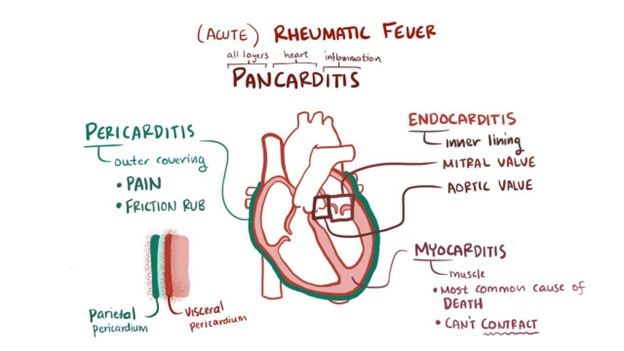The nurse is providing teaching to parents of a child diagnosed with rheumatic fever (RF). Which would be included within the teaching plan?
there should be a management regimen for electrolyte imbalance
The child will recover fully requiring no further treatment in the future
the child will need prophylactic antibiotics for invasive procedures
a diagnosis of RF may have genetic implications for future offspring
The Correct Answer is C
Rheumatic fever (RF) is a complication that can occur after an untreated or inadequately treated streptococcal throat infection (strep throat). It can affect the heart, joints, skin, and brain. One important aspect of managing RF is to prevent further episodes of strep throat, as it can trigger recurrent RF. Therefore, the child with a history of RF will require prophylactic antibiotics (usually penicillin or a related antibiotic) before certain invasive procedures, dental work, or surgeries to prevent strep throat and subsequent recurrence of RF.

Option A is not specific to rheumatic fever, and while electrolyte imbalances may be monitored and managed in certain cases of severe illness, it is not a core aspect of managing RF.
Option B is not accurate. While many children with RF do recover fully with appropriate treatment, they may be at risk of developing rheumatic heart disease, which can lead to long-term complications if not managed properly.
Option D is not a direct implication of RF. Rheumatic fever is not a genetically inherited condition, but a complication of strep throat caused by a bacterial infection. There is no evidence to suggest that having RF would directly affect the genetic implications for future offspring.
Nursing Test Bank
Naxlex Comprehensive Predictor Exams
Related Questions
Correct Answer is B
Explanation
When providing teaching to a parent of a child with celiac disease, the nurse should recommend food choices that are gluten-free. Celiac disease is an autoimmune disorder triggered by the ingestion of gluten, which is a protein found in wheat, barley, rye, and their derivatives. Gluten damages the small intestine lining in individuals with celiac disease, leading to various gastrointestinal and nutritional issues.
The correct food choice for a child with celiac disease is B. Rice. Rice is naturally gluten-free and can be a safe and nutritious option for individuals with celiac disease. Other gluten-free options include corn, quinoa, oats (certified gluten-free oats), potatoes, and many fruits and vegetables.
A. Barley: Barley contains gluten, which is harmful to individuals with celiac disease. It should be avoided in the child's diet.
C. Rye: Rye also contains gluten and should be avoided in the child's diet. It can cause damage to the small intestine in individuals with celiac disease.
D. Wheat: Wheat is a primary source of gluten and is strictly off-limits for individuals with celiac disease. It is essential to avoid all wheat-containing products, including bread, pasta, and baked goods.

Correct Answer is B
Explanation
Following a cardiac catheterization, the nurse should provide the parent with appropriate discharge instructions to ensure the child's proper recovery. The correct instruction to include is option B: "Give the child acetaminophen for discomfort."
Explanation:
Option A: Offering the child clear liquids for the first 24 hours is not a typical instruction following a cardiac catheterization. After the procedure, the child may be allowed to resume a regular diet, as tolerated, based on the healthcare provider's orders.
Option B: This is the correct instruction. After cardiac catheterization, the child may experience some discomfort at the insertion site or the area where the catheter was threaded through the blood vessels. Acetaminophen can be used to manage mild pain or discomfort.
Option C: Taking a tub bath for the first 3 days is not typically mentioned in discharge instructions after a cardiac catheterization. The nurse might advise the parent to avoid submerging the catheter insertion site in water for a specific period and instead use sponge baths until permitted by the healthcare provider.
Option D: Keeping the child home for 1 week is not a standard recommendation for a cardiac catheterization. The recovery period after a cardiac catheterization is usually shorter, and the child can often resume normal activities within a day or two, depending on the specific circumstances of the procedure and the child's condition.
The nurse should thoroughly review the specific discharge instructions provided by the healthcare provider and ensure the parent understands the care required at home, including any restrictions on activities or signs of potential complications that require immediate attention.
Whether you are a student looking to ace your exams or a practicing nurse seeking to enhance your expertise , our nursing education contents will empower you with the confidence and competence to make a difference in the lives of patients and become a respected leader in the healthcare field.
Visit Naxlex, invest in your future and unlock endless possibilities with our unparalleled nursing education contents today
Report Wrong Answer on the Current Question
Do you disagree with the answer? If yes, what is your expected answer? Explain.
Kindly be descriptive with the issue you are facing.
